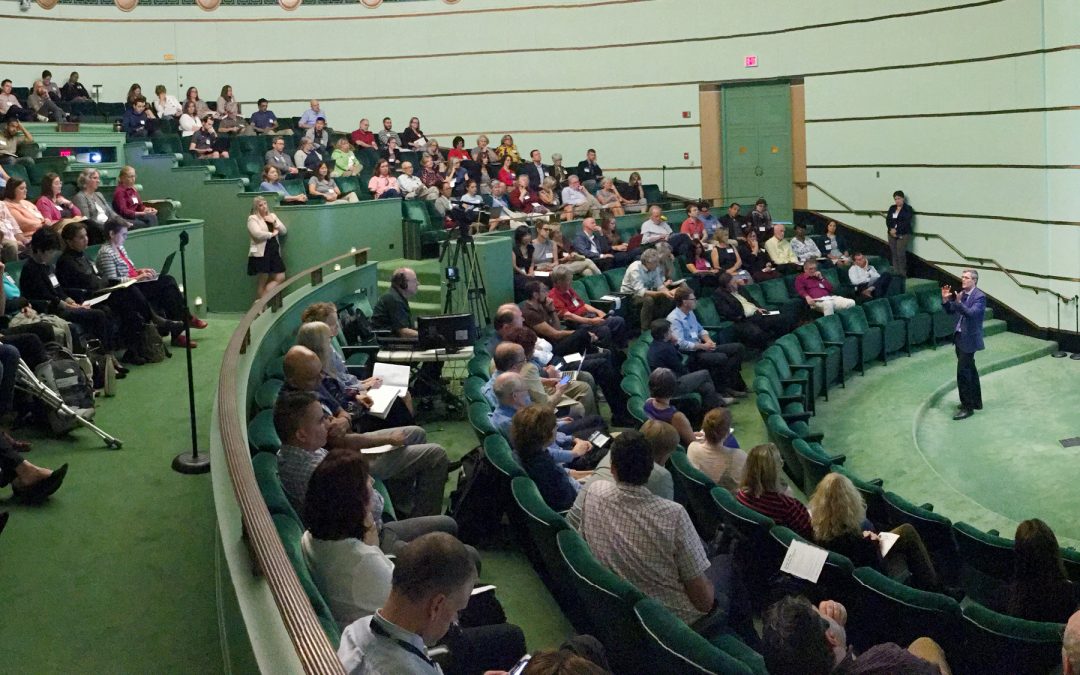Rackham Graduate School has launched a new Strategic Vision for Graduate Education, a multi-year plan that outlines goals and objectives to reimagine graduate education at U-M in a way that emphasizes a holistic view of graduate training. This will include, among other things, preparing students for an expanded range of career opportunities, strengthening student diversity, and providing outlets for interdisciplinary, project-based approaches to solving complex, real-world problems for both doctoral and master’s students.
Rackham Dean Mike Solomon introduced the school’s strategic vision at an address on September 18 in the Rackham Amphitheatre. The event was attended by more than 100 faculty members representing all three campuses, in addition to students, staff, and others across the U-M community.
Solomon began by outlining some of the pressures on graduate education that are driving this work: expanding career pathways for doctoral students, the need for master’s training to develop new programs in emerging fields as quickly as society demands, public skepticism about the costs and benefits of graduate education, concerns around graduate-student mental health, and rare but unacceptable instances of misuse or abuse of the faculty/student relationship.
I believe we have an opportunity at Michigan to respond to these pressures by seeking to transform the model of graduate education.
—Mike Solomon, Dean
“We at Rackham have spent the last year thinking about these pressures and developing an understanding through conversations with faculty and students, through data and surveys we conduct to understand the experience of students in the graduate school, and through national reports and discussions with our peers,” Solomon said. “I believe we have an opportunity—especially at Michigan, given our scope as a world-class research enterprise and our position of leadership in graduate education on the national level—to respond to these pressures by seeking to transform the model of graduate education.”
At its core, this transformation involves an approach that is “student centered, faculty led, and Rackham supported,” Solomon said. He stressed that upholding Michigan’s longstanding commitment to training excellent researchers requires faculty to seize the opportunity to innovate and create state-of-the-art curricula offered at the highest standards. He further recognized the unique challenges today’s students face and the need to incorporate their own scholarly and research interests, needs for academic and professional development, and career aspirations into their curricula and training.
Outside of avenues to reimagine the academic experience of graduate students, Solomon detailed other goals of the strategic vision: expanding the diversity and inclusion of student viewpoints and backgrounds in U-M graduate programs; enhancing partnerships between Rackham and graduate-program faculty, students, alumni, and staff; and strengthening Rackham’s own organizational culture and climate.
He highlighted several existing campus and Rackham initiatives that align with the aims of Rackham’s strategic vision, noting that his goal was for Rackham “to connect and support efforts like these so that their effect can be amplified in a way that will have a broad impact on students across disciplines.”
Finally, he announced programs that are launching now as a result of the strategic-vision planning process. These included four new MCubed Diamond projects to drive innovation in both master’s and doctoral education at U-M, the formation of a Graduate-Student Mental-Health Task Force, and a review of the Rackham Merit Fellowship program with an eye toward enhancing students’ sense of belonging and inclusion in their programs. Rackham will also host a national symposium on issues in graduate education, which will take place February 7, 2020.
Watch a video of Dean Solomon’s address.

